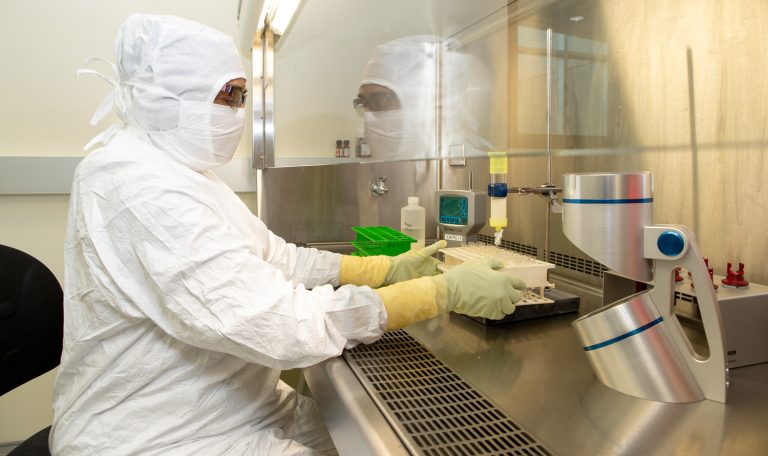McMaster University will take a leading role in a new federal initiative designed to protect Canadians against future pandemics and emerging threats through the Canadian Pandemic Preparedness Hub (CP2H).
CP2H — co-led by McMaster and the University of Ottawa — is one of five major research hubs and part of a $10 million investment announced March 2 by François-Philippe Champagne, minister of Innovation, Science and Industry, and Jean-Yves Duclos, minister of Health.
The multidisciplinary research hubs — funded through Stage 1 of the integrated Canada Biomedical Research Fund (CBRF) and Biosciences Research Infrastructure Fund (BRIF) — will accelerate the research and development of next-generation vaccines, therapeutics and diagnostics and their commercialization, while supporting training to expand the pipeline of skilled talent.
“This funding for research, talent development and infrastructure projects is the foundation that will help us build a stronger, more robust domestic biomanufacturing sector in Canada that responds to the needs of Canadians for years to come,” Champagne said.
CP2H brings together more than 45 strategic partners from academia, industry, non-profit and governmental agencies from across the country to ensure Canadian discoveries are turned into the medicines of tomorrow in a cost-effective and timely fashion.
Its lead scientists are “academic entrepreneurs” who have organized national team projects and have led the design, building and acquisition of the specialized infrastructure that is key to the hub’s success.
McMaster is on the leading-edge of pandemic-related research at Canada’s Global Nexus for Pandemics and Biological Threats, said Karen Mossman, McMaster’s vice-president, research, adding that Hamilton — driven, in part, by the McMaster Innovation Park — is one of the country’s fastest growing life sciences clusters.
“We’re perfectly positioned to co-lead this initiative and work with our industry and academic partners to support both Canada’s and Ontario’s life sciences strategy, expand our innovation ecosystem and bridge the gap between lab and market,” Mossman said.
The Global Nexus for Pandemics and Biological Threats is central to the hub and will play a critical role in its success, said Gerry Wright, executive director of Global Nexus.
“McMaster – through Global Nexus – will provide world-class talent and infrastructure to the hub’s partners to create a vibrant biomanufacturing sector that will increase the country’s life sciences capacity and ensure Canadians are fully prepared to prevent and respond to future pandemics,” Wright said.
Matthew Miller, scientific director of the Michael G. DeGroote Institute for Infectious Disease Research and a member of Global Nexus, will serve as CP2H’s inaugural co-scientific director. Mossman will chair the hub’s advisory board.
Sylvain Charbonneau, the University of Ottawa’s vice-president, research and innovation, said the team is very eager to actively contribute to this ground-breaking national effort to grow a strong and competitive biomanufacturing and life sciences sector.
“The ultimate goal is to make Canada a global leader in emerging vaccines, therapeutics and diagnostics, enhancing the national capacity to prevent and respond to future pandemics,” said Charbonneau.
The government also announced the launch of Stage 2 — a national competition that includes $570M of funding for cutting-edge research, talent development and research infrastructure projects associated with the new research hubs.


